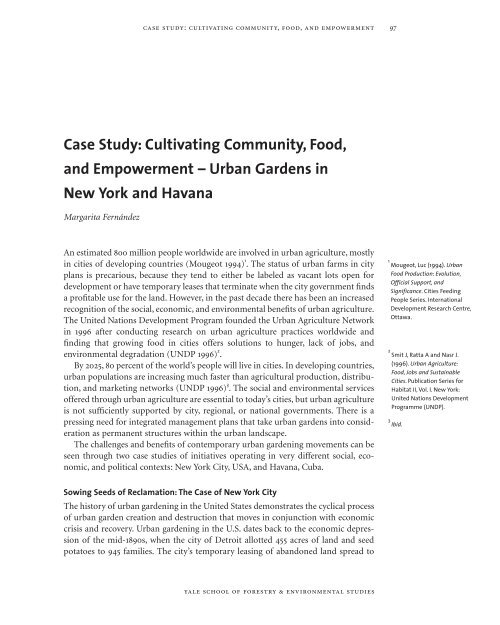Agroecology and the Struggle for Food Sovereignty ... - Yale University
Agroecology and the Struggle for Food Sovereignty ... - Yale University
Agroecology and the Struggle for Food Sovereignty ... - Yale University
You also want an ePaper? Increase the reach of your titles
YUMPU automatically turns print PDFs into web optimized ePapers that Google loves.
case study: cultivating community, food, <strong>and</strong> empowerment<br />
97<br />
Case Study: Cultivating Community, <strong>Food</strong>,<br />
<strong>and</strong> Empowerment – Urban Gardens in<br />
New York <strong>and</strong> Havana<br />
Margarita Fernández<br />
An estimated 800 million people worldwide are involved in urban agriculture, mostly<br />
in cities of developing countries (Mougeot 1994) 1 . The status of urban farms in city<br />
plans is precarious, because <strong>the</strong>y tend to ei<strong>the</strong>r be labeled as vacant lots open <strong>for</strong><br />
development or have temporary leases that terminate when <strong>the</strong> city government finds<br />
a profitable use <strong>for</strong> <strong>the</strong> l<strong>and</strong>. However, in <strong>the</strong> past decade <strong>the</strong>re has been an increased<br />
recognition of <strong>the</strong> social, economic, <strong>and</strong> environmental benefits of urban agriculture.<br />
The United Nations Development Program founded <strong>the</strong> Urban Agriculture Network<br />
in 1996 after conducting research on urban agriculture practices worldwide <strong>and</strong><br />
finding that growing food in cities offers solutions to hunger, lack of jobs, <strong>and</strong><br />
environmental degradation (UNDP 1996) 2 .<br />
By 2025, 80 percent of <strong>the</strong> world’s people will live in cities. In developing countries,<br />
urban populations are increasing much faster than agricultural production, distribution,<br />
<strong>and</strong> marketing networks (UNDP 1996) 3 . The social <strong>and</strong> environmental services<br />
offered through urban agriculture are essential to today’s cities, but urban agriculture<br />
is not sufficiently supported by city, regional, or national governments. There is a<br />
pressing need <strong>for</strong> integrated management plans that take urban gardens into consideration<br />
as permanent structures within <strong>the</strong> urban l<strong>and</strong>scape.<br />
The challenges <strong>and</strong> benefits of contemporary urban gardening movements can be<br />
seen through two case studies of initiatives operating in very different social, economic,<br />
<strong>and</strong> political contexts: New York City, USA, <strong>and</strong> Havana, Cuba.<br />
1 Mougeot, Luc (1994). Urban<br />
<strong>Food</strong> Production: Evolution,<br />
Official Support, <strong>and</strong><br />
Significance. Cities Feeding<br />
People Series. International<br />
Development Research Centre,<br />
Ottawa.<br />
2 Smit J, Ratta A <strong>and</strong> Nasr J.<br />
(1996). Urban Agriculture:<br />
<strong>Food</strong>, Jobs <strong>and</strong> Sustainable<br />
Cities. Publication Series <strong>for</strong><br />
Habitat II, Vol. I. New York:<br />
United Nations Development<br />
Programme (UNDP).<br />
3 Ibid.<br />
Sowing Seeds of Reclamation: The Case of New York City<br />
The history of urban gardening in <strong>the</strong> United States demonstrates <strong>the</strong> cyclical process<br />
of urban garden creation <strong>and</strong> destruction that moves in conjunction with economic<br />
crisis <strong>and</strong> recovery. Urban gardening in <strong>the</strong> U.S. dates back to <strong>the</strong> economic depression<br />
of <strong>the</strong> mid-1890s, when <strong>the</strong> city of Detroit allotted 455 acres of l<strong>and</strong> <strong>and</strong> seed<br />
potatoes to 945 families. The city’s temporary leasing of ab<strong>and</strong>oned l<strong>and</strong> spread to<br />
yale school of <strong>for</strong>estry & environmental studies

















